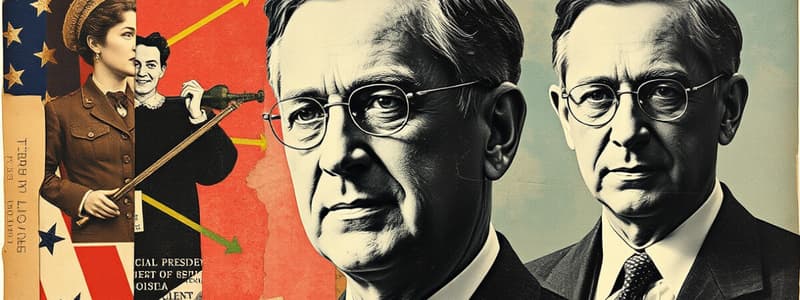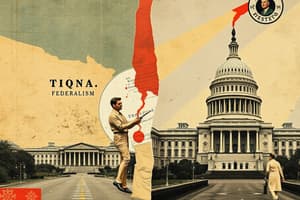Podcast
Questions and Answers
What is the main political value of the vice president?
What is the main political value of the vice president?
- To manage the federal budget
- To serve as acting president during an absence
- To bring the president votes in the election from unlikely sources (correct)
- To lead diplomatic negotiations
What does the Council of Economic Advisers do?
What does the Council of Economic Advisers do?
Analyzes the economy and economic trends
______ was the first first lady to seek public office on her own.
______ was the first first lady to seek public office on her own.
Hilary Clinton
The State of the Union address is mandated by the ______.
The State of the Union address is mandated by the ______.
The goal of the War Powers Resolution was to limit the power of the president to commit American troops without ______.
The goal of the War Powers Resolution was to limit the power of the president to commit American troops without ______.
The power to receive ambassadors is an example of ______.
The power to receive ambassadors is an example of ______.
The president's delegated powers come from ______.
The president's delegated powers come from ______.
During the nineteenth century, ______ was America's dominant institution of government.
During the nineteenth century, ______ was America's dominant institution of government.
All executive agreements differ from formal treaties in that they ______.
All executive agreements differ from formal treaties in that they ______.
An informal group of advisers to the president is often called the ______.
An informal group of advisers to the president is often called the ______.
Flashcards are hidden until you start studying
Study Notes
Political Strategies
- The vice president's main political value is to secure votes from unlikely sources such as specific groups or religions during elections.
Economic Advisory
- The Council of Economic Advisers provides analysis of the economy and trends, aiding the president in anticipating economic events.
Historical Figures
- Hillary Clinton made history as the first First Lady to pursue public office independently.
Constitutional Responsibilities
- The State of the Union address is mandated by the Constitution, emphasizing the president's duty to inform Congress on the nation's status.
Military Powers
- The War Powers Resolution aims to limit the president's authority to deploy American troops without congressional approval.
Presidential Powers
- Receiving ambassadors is classified as an expressed power of the president.
Delegated Powers
- The president's delegated powers are derived from Congress, highlighting the legislative branch's role in governance.
Government Structure
- In the 19th century, Congress held prominence as the dominant institution in the American government system.
Executive Agreements
- Unlike formal treaties, executive agreements do not require Senate approval, streamlining international agreements made by the president.
Advisory Groups
- An informal advisory group supporting the president is often referred to as the "Kitchen Cabinet."
Studying That Suits You
Use AI to generate personalized quizzes and flashcards to suit your learning preferences.




